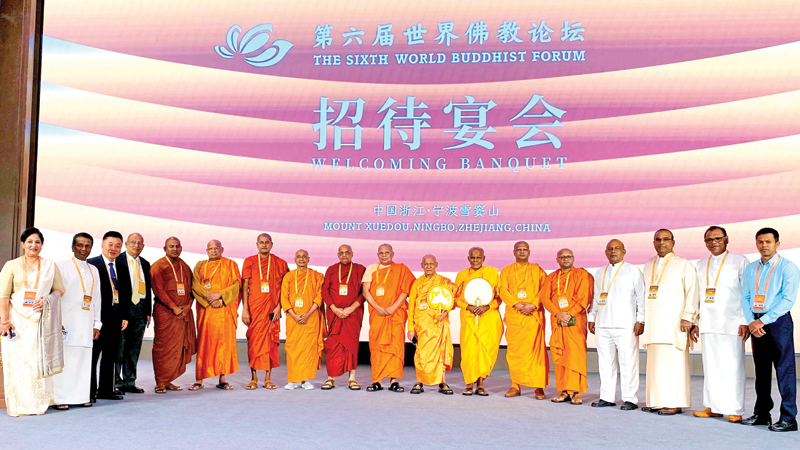A Sri Lankan Buddhist delegation led by the Most Ven. Karagoda Maithri Moorthi Mahanayaka Thera of the Amarapura Sangha Sabawa attended the sixth World Buddhist Forum held in Ningbo, China recently. Buddhist delegations from 72 countries took part in the 6th World Buddhist Forum from June 15 to 17 in Xikou, a scenic mountain city of Ningbo organised by the Buddhist Association of China under the theme, “Hand in hand For coexistence.”
Buddhist delegates from Theravada, Mahayana and Tantryana tradition made presentations at the forum and held a Buddhist ceremony to bless all the people in the world. A Buddhist exhibition was inaugurated and showcased exhibits depicting the arrival of Buddhism from India to China and historical developments of Buddhism in China over a period of 1,800 Years. One of the highlights was the contribution by Ven. Heung San and Ven. Fa Xian Theras who visited Sri Lanka over 1,600 years ago in search of the Dhamma.
Over 800 delegates and scholars from 72 countries attended the forum. The Sri Lankan Buddhist delegation consists of Most Ven. Wendaruwe Upali Anunayake Thera of the Asgiriya Chapter, Most Ven. Dimbulkumbure Wimaladhamma Anunayake Thera of the Malwatte Chapter, Most Ven. Deewela Mahinda Anunayake Thera of the Rammanna Chapter, Most Ven. Balapitiye Seewali Thera, Secretary General of the Amarapura Sangha Sabawa, Ven. Dr. Kollupitiye Mahinda Thera and the Most Ven. Dr. Akuaretiye Nanda Thera were among the 25-member delegation from Sri Lanka representing all four Chapters and the same was organised by the Embassy of the People’s Republic of China and the Sri Lanka China Buddhist Friendship Association.
Addressing the 6th World Buddhist Forum, Most Ven Maithri Moorthi Mahanayaka Thera reminisced the contribution made by Ven. Fa Xian Thera who lived in Sri Lanka for over two years and took Dhamma text books to China to propagate Buddhism in China and the age-old Buddhist friendship between Sri Lanka and China.
He said, “I stand here today, deeply honoured to represent the Buddhist community of Sri Lanka at this auspicious gathering, the Sixth World Buddhist Forum. We convene in this revered assembly not merely as representatives of different nations or traditions, but as seekers of a shared vision—peace, wisdom, and compassion for the well-being of all beings.”
He said this year, as we gather in the historic city of Ningbo, with the noble aim of promoting world peace and building a community with a shared future for humanity, I am reminded of the timeless teachings of the Buddha, which have always pointed towards a harmonious existence. As we delve into the essence of Buddhism at this forum, let us also reflect on the urgent need for unity, compassion, and ethical conduct in these turbulent times.
He said the Buddha’s message, over 2,500 years ago, was simple but profound. He taught that suffering exists, and that there is a path to its cessation. This path, the Noble Eightfold Path, guides us to live with wisdom, ethical conduct, and mental discipline, not just for our personal salvation but for the well-being of all sentient beings. This emphasis on interdependence is more relevant today than ever, as we face global challenges that transcend borders—climate change, inequality, conflict, and mental suffering.
Most Ven. Maithri Moorthi Thera said, “I will fail in my duty if I do not remember the pivotal role played by the Most Ven. Fa Xian Thera. An important landmark of the historical political, cultural, and Buddhist relations that existed from time immemorial was the arrival of Chinese bhikkhu Faxian from India in 410 BC in search of Buddhist chronicles and Buddhism to Sri Lanka.
Ven. Faxian Thera lived at the historical Abhayagiri Vihara at Anuradhapura over 2 1/2 years and translated important Buddhist Chronicles to the Chinese Language. He took back to China these Buddhist chronicles, which helped to develop and propagate Buddhism in China.
Another important contribution was made by Ven. Amogskvajra Thera (705-774AD) of Sri Lanka, who visited China in 720 AD to propagate Buddhism in China. Thus, religious interrelationships between the two countries were formed and this common bond became an influence that brought these two ancient civilisations together, he said.
He said this forum, initiated in 2006 by the Chinese Buddhist community, has grown into the largest platform for international Buddhist exchange. It symbolises a vital truth: that while we may belong to different countries, we are united by the timeless values of the Buddha’s teachings. From Sri Lanka to China, from the East to the West, Buddhism has flourished by adapting to local cultures while staying true to its core principles—principles that teach us to overcome hatred with love, greed with generosity, and ignorance with wisdom.









